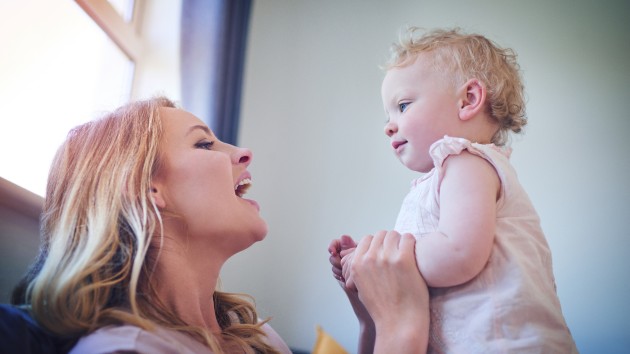PeopleImages/iStock(NEW YORK) — A baby’s first words are an important milestone for many parents.However, for some kids dubbed “late talkers,” parents may be left worried and turn to speech therapists for help.Instead of having to travel to a doctor’s office, some parents opt for a more accessible way to help their kids by seeking advice from speech therapists like the Speech Sisters — Brooke Dwyer and Bridget Hilsberg — on Instagram.The sisters have 20 years of combined experience and have run a private practice for eight years, working with hundreds of families to help get their kids who are late talkers communicating.”A late talker is a child who understands language, but they’re just not meeting their communication milestones,” Dwyer told ABC News’ Good Morning America. “So they probably don’t have as many words as they should have for their age.”On their Instagram, Brooke and Bridget share practical tips for parents to help get their kids chatting.They even offer courses for parents on their website, like the “Late Talker Course” and the “Talk On Track” course, that parents can start with their little ones from birth to 14 months so they can learn to meet language milestones.For Christine Levin’s 18-month-old son Everett, the Speech Sisters’ methods worked, ultimately helping him grow his vocabulary from just five words to 35.
“It feels good to see your son’s language grow and have him happy and able to communicate,” Levin told GMA.
Here are some of their tips to help get babies talking:1. Baby talk is beneficialWhile there are mixed opinions about baby talk, the Speech Sisters say that it can be beneficial if used the right way. According to Bridget and Brooke, baby talk, also known as “motherse,” “parentese” or “infant-directed speech,” helps babies learn. And when you speak to babies in this manner, they become more engaged.The right way: Use a high-pitched, exaggerated speech containing real words and correct grammar like, “You want water in your cup?”The wrong way: using made up words with incorrect sounds or grammar. It may sound like this, “You want a ‘wittle’ wawa in your ‘cuppie’?”2. Read with your babyReading with babies is one of the best ways to keep them engaged so they can learn more language, the Speech Sisters say.And the best way to do this is to read to them when they are facing you. When a baby is facing you, they’re able to watch your mouth as you say the words and see your expressions and gestures. By facing each other, you’re making reading more interactive and research shows that having back-and-forth interactions improves language.Another tip that Bridget and Brooke encourage parents to try is to make the book “come alive” by being silly and having fun.
“If there is a glass of water in the book, drink it! If there is food in the book, eat it! And you don’t have to read all the words when your baby is little, just highlight a few key words,” they said.3. Again and againThe first instinct for many parents trying to get their kids to talk is to repeatedly say a word or an object, like, “Say ‘truck,’ say ‘truck."” While it’s natural to resort to this, the Speech Sisters say it puts pressure on babies.Instead of telling kids to say anything repeatedly, it’s best to repeat a word at least five times during an interaction, that way more opportunities are given for babies to learn.4. Parents need to waitAnother instinct that parents turn to is finishing sentences for their kids when they don’t talk for themselves.”It’s unnatural,” said Brooke. “It’s hard to wait, you wanna talk for him, especially when he’s not talking for himself.”So instead of speaking for your child, Brooke and Bridget say to wait about five to 10 seconds to give them the opportunity to talk. And if they’re not saying anything after that time is over, you can give them the word.
Copyright © 2020, ABC Audio. All rights reserved.












